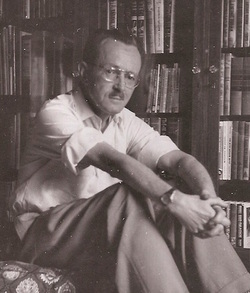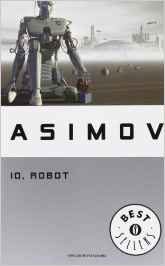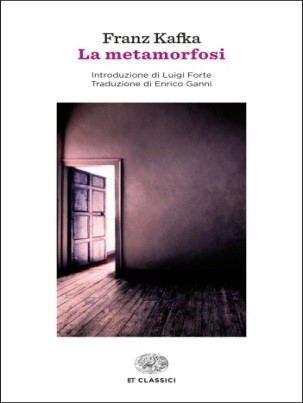
This project promotes open access materials and has been funded with support from the European Commission - Erasmus+ program. These materials reflect the views only of the author, and the Commission cannot be held responsible for any use which may be made of the information contained therein.
[Project Number: 2016-1-HR01-KA201-022159]
![]()
Book title
Pattern; Sentry
Author
Fredric Brown

Bibliographic information
Published by Arnoldo Mondadori in 2002; Einaudi Scuola, 2004
Links (adaptations, reviews, full texts etc.)
http://www.coris.uniroma1.it/sites/default/files/sentinella.pdf
https://it.wikipedia.org/wiki/Fredric_Brown
Theme
Science fiction
Short summary
These two short stories complement each other: in Pattern, Miss Macy sprays insecticide in her garden, likewise the giant aliens spray a lethal substance on the earth. In Sentry, the main character, a sentry on a distant planet kills an alien, a repulsive two-eyed and two-legged creature, that is a human being.
Why is the story appropriate for the targeted groups of RSP readers?
The two science fiction stories make young readers reflect upon somewhat arrogant attitudes that often characterize those people who feel superior to others; they may also wonder about different perspectives on humans and on aliens .
What are the distinguished readers interests reflected by this book/story?
In each story, the narrator employs an unexpected point of view, thus driving young readers to consider the consequences of superficial behaviours, which are often the outcome of prejudices.
Why is this story motivational for the pupils?
The unexpected end and the narrative technique of estranging effect are extremely appealing to young readers, who are eager to read other similar texts.
Is there a historical, political, multi/inter cultural, migrant or similar context recognized in this book/story?
No, there isn't.
Is there a principle of inclusion reflected in this book/story and does it promotes understanding of cultural diversities and heritage?
The theme of diversity is dealt with at a science fiction level: aliens and humans.
Title of Activity
Debating
Description of educational activity
Duration: 2 hours
Pupils’ age: 15-16
Organization of the class of pupils: group work
Pupils' tasks: Students carefully study the texts in order to discuss the main topic of the text, at first, freely, and later, guided by specific questions asked by teachers.
Support materials:
- articles and essays students find on the Internet.
Evaluation and assessment method: This activity will be assessed by students themselves, while making comparisons. Students love exchanging opinions on what they have previously read on their own: they get involved when they compare their views/impressions and later, with the help of the teacher, they are led to reflect upon burning issues such as, the unstoppable process of robots' replacing men in several workplaces or excessive and somewhat dangerous humanisation of machines.
Effect of the activity on RSP reading: Exchanging viewpoints on contemporary issues, while drawing on a book as a common heritage, surely helps and promotes love of reading.
Connection to curriculum
Grade: 3rd year
Related objectives: discussing and defending personal ideas and opinions is one on the main objectives of the 3rd year (students also learn how to write an essay throughout the 3rd year).
Knowledge: reading, understanding and developing personal opinions
Skills: working in groups, singling out/spotting the main information of a text
Competences: connecting fiction and reality, defending and supporting an opinion
Bibliographic reference to be used during the activity
Italian version
Isaac Asimov
Io, robot
Arnoldo Mondadori Editore
2004
pp. 271
ISBN 88-04-53410-9.

Digital sources
The 2004 filmed version of "I, robot" starring Will Smith is extremely renowned. Moreover, with regards to the topic of man's enslaving process to technology, it could be worth watching, Black Mirror, the TV series broadcast on Netflix.
Results
Linking ideas and important issues, while reading texts. Making observations, reflecting and wondering about crucial matters
Recommendations
Discussing and debating enable students to fully get engaged in reading, to realise how close it is to their daily lives and to arouse their curiosity and doubts. The teacher can evaluate what students have actually understood and achieved.
Book title
The metamorphosis
Author
Franz Kafka

Bibliographic information
Bur Biblioteca Universale-Rizzoli.2013
Links (adaptations, reviews, full texts etc.)
- http://www.scritturaimmanente.it/kafka/racconti/comm_metam/analisi.htm
- http://giorgiobaruzzi.altervista.org/blog/kafka-risveglio-gregor-samsa-metamorfosi/
Theme
Fantasy
Short summary
The Metamorphosis is a novella by Franz Kafka, first published in 1915. The story begins with a travelling salesman, Gregor Samsa, waking to find himself transformed into a large, monstrous insect-like creature. He is not concerned about his new physical appearance, but about his being unable to perform the tasks expected of him , as a model employee.
Why is the story appropriate for the targeted groups of RSP readers?
The novel can be considered a psychological fantasy, a genre which is highly appreciated by young readers, who especially tend to be interested in gaining a psychological insight of themselves in order to find out more about their mysterious inner world.
What are the distinguished readers interests reflected by this book/story?
Psychology appeals to young readers because they try to find explanations about their inner world and about what other people think of them.
Why is this story motivational for the pupils?
Because young readers are afraid of changes, even though they have to cope with them since adolescence is an age marked by great changes: from childhood to adolescence.
Is there a historical, political, multi/inter cultural, migrant or similar context recognized in this book/story?
No, there isn't.
Is there a principle of inclusion reflected in this book/story and does it promotes understanding of cultural diversities and heritage?
No, there isn't
Title of Activity
Reading for fun
Description of educational activity
Duration: 2 hours
Pupils’ age: 14-16
Organization of the class of pupils: group work
Pupils' tasks: Students read the extract “Gregor Samsa wakes up” from Kafka’s “Metamorphosis” and analyse it, following the teacher’s instructions. In this first step they work individually, in order to test their ability to analyse extracts, their knowledge of the psychological-fantasy genre and of the author. Then, they organize teams of 4-5 elements to simulate the quiz game broadcast by the third channel of Italian TV on Saturday afternoons “Per un pugno di libri”. Each team chooses the students who are in charge of answering the questions on authors, titles of works, genres, characters and contents of stories.
Support materials:
- The extract “Gregor Samsa wakes up” , from Kafka’s “Metamorphosis”.
- A Map of the fantasy genre: fantasy and fairy tales
- Brother Grimms’ fairy tales “Hansel and Gretel” “Cinderella” and “Little Red Riding Hood”, from : Jacob e Wilhelm Grimm, “Fiabe”- Oscar Classici-Mondadori.
- Lists of authors and titles of novels from different countries, read at school, given by the teacher.
Evaluation and assessment method:
The challenge triggers competition both inside the group and among the groups belonging to the other classes involved in the Project.
Games constitute an effective way of learning just because they actively involve all students, who learn while playing.
All students have read the 4 extracts proposed for the analysis and have done homework about them.
Connection to curriculum
Grade: 2nd grade
Knowledge:
- Narrative techniques
- Basic structures of narrative texts
- The fantasy genre and the fairy tales.
Skills:
- Being able to distinguish the peculiar characteristics of the literary genres, recognizing fantasy, horror and terror.
Competences:
- Reading
- Understanding and interpreting written texts of various kinds, and in particular, using information/knowledge to face a team game, following the rules.
Bibliographic reference to be used during the activity
Italian version
La Metamorfosi di Franz Kafka n. 70 pagine
Editore: Einaudi (7 marzo 2014)
Collana: Einaudi tascabili. Classici
Lingua: Italiano
ISBN-10: 8806220632
ISBN-13: 978-8806220631

Digital sources
The extract is well suited for the narrative analysis requested by the team game modelled on the tv programme “Per un pugno di libri”.
- http://www.perunpugnodilibri.rai.it/
- http://www.culturaitalia.it/viewItem.jsp?language=en&case=&id=oai%3Aoaicat.indire.it%3AD-JFVG4GFS
- http://doc.studenti.it/scheda-libro/italiano/5/metamorfosi-franz-kafka.html
- http://www.hoepli.it/libro/fiabe/9788804672050.html
Results
The science fiction genre is highly appreciated by young people who know it also thanks to the cinema. The literary text differs from the film as it does not involve the use of special effects, therefore it offers the opportunity for a deeper reflection on the themes and the possibility to analyse the characters accurately especially if we want to introduce creative writing.
Recommendations
The role play of the “impossible interview” arouses students’ interest and encourages accurate and intensive reading. It enriches vocabulary and fosters oral and written linguistic skills.
Contact
X gimnazija ''Ivan Supek''
Ul. Vjekoslava Klaića 7
10000
Zagreb
E-mail: partners@handbook4rspreaders.org










